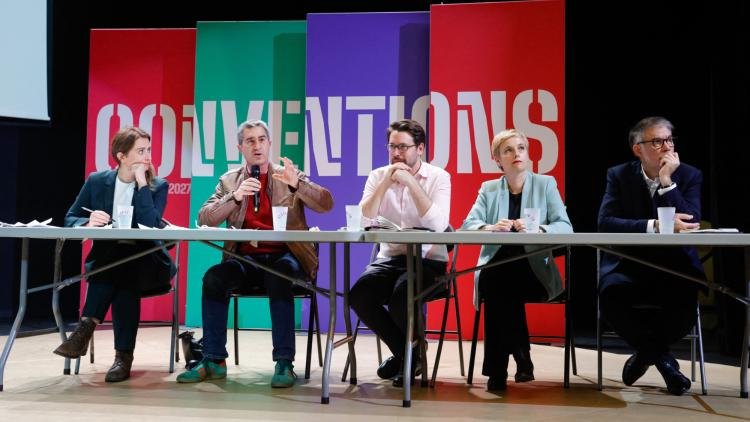The United Left has announced its primary for the fall of 2026 to nominate a single candidate for the 2027 presidential election. Despite the rejection of Jean-Luc Mélenchon and Raphaël Glucksmann, the PS, EELV, and Génération. SS leaders want to create a common dynamic with a calendar and thematic conventions to build the “Popular Front 2027”.
In recent weeks, calls for primaries have been growing on both the right and the left ahead of the 2027 presidential election. The United Left, which defends a general candidacy, has fixed its primary for the fall of 2026, this Saturday, November 15, at a rally in Trappes (Evelines).
Socialist Party boss Olivier Faure, head of the ecologist Marine Tondelier, ex-LFI deputies Clémentine Auten (L’Après) and François Ruffin (Debut!), as well as Benjamin Lucas, coordinator of Generations, met Lucie Cassettes, a joint candidacy with the idea of the left-wing 2000, announced in Bagneux (Hauts-de-Seine) in July. A.
A primary is confirmed despite the absence.
Everyone agreed on the principle of the primary “in the fall of 2026,” announced Lucy Cassetts. Details, dates, and terms will be announced in the first half of December.
Even if the two best left-wing candidates in the election, Jean-Luc Mélenchon (LFI) and Raphael Glucksmann (Place Publique), refuse to participate, Lucie Cassets remains optimistic. “We always have hope. There is momentum. Everyone present at Bagneux on July 2 responded,” he assured.
Marin Tondelia criticized the attitude of the absentees: “It is quite understandable to want to run for the highest political office for fear of the voters of your own camp.”
Olivier Faure qualified: “The problem is not elephants. Look here, you have rats. And often, rats win. The question for us is the mouse hole through which we have to win against an extreme right presented as the winner. “When this primary is done, when millions of people have expressed their choice, who will stand by it? “he will hate it.
Francois Ruffin acknowledged the uncertainty surrounding the announcement: “I don’t know if the initial bet will win, but we’re doing it because it’s the only chance we have.”
The participants of this union opened a first convention on education, which would be followed by others devoted to industry, employment, and international issues. The whole aim is to create the common project of “Popular Front 2027”.
A recipe is often synonymous with failure.
In France, primaries are a recent political tool. The first organized by the PS in 1995 was between Lionel Jospin and Henri Emmanuel-Weill. I
Since then, primaries have lost their credibility. The last exercises for the PS and Les Républicains produced unsuccessful candidates: Benoit Hamon (6% in 2017), Valérie Pécresse (4.78% in 2022) and Anne Hidalgo (1.75% in 2022). These failures show that primaries were designed to legitimize weak parties, compensating for a lack of staff and members through media mobilization.
The election of Emmanuel Macron in 2017 shook up logic. A candidate without a major political background, without a traditional party, won the presidential election with En Marche, a party created a year before the primaries ceased to function.
Today, those who propose these primaries present either a lack of notoriety (David Lisnard) or a difficulty in voting (Laurent Vauquez, Marine Tondelier). Candidates in advantageous positions, such as Édouard Philippe, Raphaël Glucksmann, or Jean-Luc Mélenchon, refuse any primary process. So the challenge for the left is to build The United Left has announced its primary for the fall of 2026 to nominate a single candidate for the 2027 presidential election. Despite the rejection of Jean-Luc Mélenchon and Raphaël Glucksmann, leaders from the Socialist Party, EELV, and Génération. SS is aiming to create a common dynamic with a schedule and thematic conventions to establish the “Popular Front 2027.”
Calls for primaries have been gaining traction on both the right and left in anticipation of the 2027 election. The United Left, advocating for a unified candidacy, has set its primary date for the fall of 2026, during a rally in Trappes (Evelines) on Saturday, November 15.
Lucie Cassets remains optimistic despite the non-participation of top left-wing candidates like Jean-Luc Mélenchon (LFI) and Raphaël Glucksmann (Place Publique). “We always have hope. There is momentum. Everyone present at Bagneux on July 2 responded,” he stated.
Marine Tondelier expressed discontent over the absentees’ attitudes, stating, “It’s understandable to aspire for the highest political position for fear of your camp’s voters.”
Olivier Faure added a thought-provoking analogy, saying, “The problem isn’t elephants; it’s rats that often win. The key question is how we can emerge victorious against an extreme right perceived as the frontrunner. Once this primary is in place, we need to consider who will support the outcome.”
Meanwhile, more established candidates like Édouard Philippe, Raphaël Glucksmann, or Jean-Luc Mélenchon continue to oppose the primary process. Consequently, the left faces the challenge of building momentum amidst these absences while emphasizing unity and civic backing. Despite this absence, it focused on unity and civic support.
